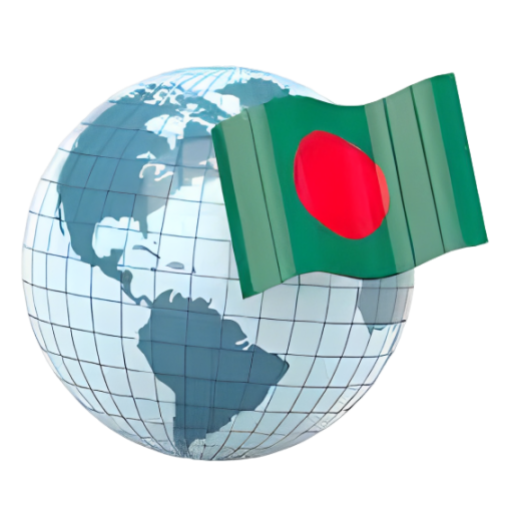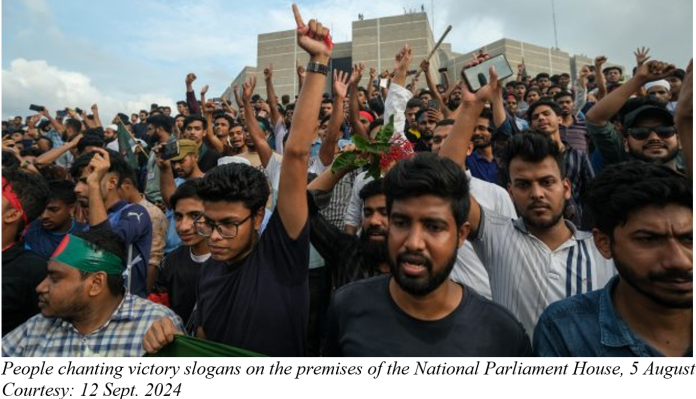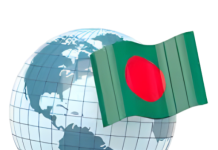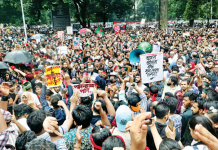After decades of the Sheikh dynasty’s dictatorship built on the “Chetona” of false propaganda, it finally crumbled on 5 August 2024. During the earth-shattering 36 days of the explosive student uprising, young leaders began questioning every issue in Bangladesh that was favourite and sacred to the fascist regime of Sheikh Hasina. They also began to examine the role of Sheikh Mujib as a leader. Even other leaders like Ershad, who devotedly served Hasina, were not spared. It was to find out who was a hero or a fascist. In this probe, they also filtered the contributions of Moulana Bhashani, Ziaur Rahman, and other national leaders.
Sheikh dynasty in Bangladesh politics
Sheikh Mujib founded the Sheikh dynasty. In the 2024 uprising, we have seen that not only was Hasina condemned as a fascist leader, but also Mujib came under intense scrutiny. Mujib statues, built around the country spending millions, were destroyed in every corner of Bangladesh in daylight. His former residence at 32 Dhanmondi Residential Area, which Hasina converted into a museum, was burned as it was condemned by the people who snatched their freedom from “killer Hasina”.
With the fall of the fascist regime of Sheikh Hasina, the Awami-constructed Mujib history came under scrutiny, and the Awami demi god’s history and the barbarity of the BAKSAL were unearthed. During Mujib’s short rule of less than 3 years (1972- 15 Aug. 1975), Mujib’s Gestapo-like para-military Rakki Bahani killed thousands extra-judicially.
Ostensibly formed to curb insurgency and maintain law and order, the Rakki Bahani was, in fact, the armed wing of the ruling Awami League and it swore an oath of loyalty to Sheikh Mujibur Rahman. In the words of Anthony Mascarenhas, it was a “gang of hoodlums little different from the Nazi Brown shirts”.
Sheikh Mujib’s Rakkhi Bahini established the culture of impunity with which security forces continued to abuse human rights during Sheikh Hasina’s rule. Forced disappearances, extra-judicial killings and brutal suppression of protests became the hall-mark of Hasina’s fascist regime, unearthed by the screening of the Ayana Ghore, where detainees were tortured.
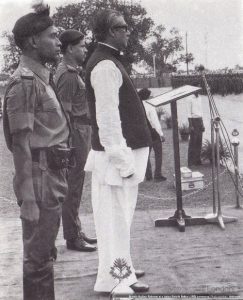 Mujib’s arrogant utterings, such as “Lal Ghora Dabaye Ditam” (will suppress the red horse, referring to the left revolutionaries); “Where are you Siraj Sikdar” (standing in the Parliament House after the extra-judicial killing of left revolutionary Seraj Sikdar); “tribals, you become Bengalis” (to the indigenous peoples seeking recognition and autonomy) were the early signs of an emerging dictator.
Mujib’s arrogant utterings, such as “Lal Ghora Dabaye Ditam” (will suppress the red horse, referring to the left revolutionaries); “Where are you Siraj Sikdar” (standing in the Parliament House after the extra-judicial killing of left revolutionary Seraj Sikdar); “tribals, you become Bengalis” (to the indigenous peoples seeking recognition and autonomy) were the early signs of an emerging dictator.
Mujib’s unwavering favouritism toward his relatives and his party followers, and misrule contributed to the famine of 1974, which resulted in the deaths of an estimated 1.5 million people, or 2% of the population at the time. The official death toll reported by the government of Bangladesh was only 27,000. The July-August uprising also brought Mujib’s election fraud in the 1974 election to light. The fascist in Mujib could not digest the idea of only a few opposition figures elected in parliament, even though he is acclaimed as a democrat.
Intense propaganda by the past fascist regime of Hasina could not hide the lies anymore. As Khalil Gibran said, “A truth can walk naked, but a lie always needs to be dressed”. The uprising led the fascist leaders to be undressed in the drama of lies versus truth.
Why did the Mujib dynasty suffer so much humiliation in 1975 and 2024? The Mujib dynasty was fundamentally based on corruption and killing of the opponents, a mafia of a kind—a House of Cards built on falsehood. It became clear to people that from the 1975 massacre of Mujib, his family and close relatives, Hasina never learned anything, but rebuilt Mujib’s fascism again; thus, history repeated itself.
It remains to be said that Mujib’s corruption, lies about his voluntary surrender in March, unfairness in politics, his politics of favouritism, extra-judicial killings of the thirty thousand of the opposition, and lastly, the killing of the infant democracy for the one party BAKSAL rule led to the House of Cards of Mujib dynasty to crumble first in 1975; then for decades, his daughter rebuilt it again with the false Mukti chetona, but crumbled miserably again, this time in 2024.
Moulana Bhashani inspires the new generation
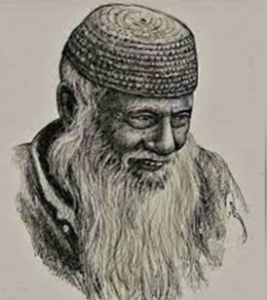 Mujib and Bhashani worked together against Pakistani rule, but it is clear that they had two different approaches to politics. In Bangladesh, Mujib became a dictator, while Bhashani remained committed to his fight against authoritarian regimes. Mujib’s imposition of an authoritarian BAKSALI rule came under fire from Bhashani. Thus, Bhashani’s struggle for democracy and humanism continued.
Mujib and Bhashani worked together against Pakistani rule, but it is clear that they had two different approaches to politics. In Bangladesh, Mujib became a dictator, while Bhashani remained committed to his fight against authoritarian regimes. Mujib’s imposition of an authoritarian BAKSALI rule came under fire from Bhashani. Thus, Bhashani’s struggle for democracy and humanism continued.
The heroes of July-August revolution seemed to acknowledge this and took lessons from Bhashani’s uprising in 1969. Even his slogan, “Jalao Jalao Agun Jalao”, against the authoritarian regime of Ayub Khan at the time was repeated by the marching students in 2024. As a leader who inspired the liberation of Bangladesh and was devoted to the common good of the people, he was appreciated and honoured.
This time, the marching students changed the false Muktijudder chetona to the truth about the 1971 Mukti Sangram. While branding Mujib as the undeserving “Father of the Nation”, many referred to the tumultuous days since 1969 mass uprising leading to liberation war during which people chanted “Nation’s father, Moulana Bhashani”.
Musjib’s “Father of the nation” title was abandoned once before, following his death in 1975. It was questioned not only because Mujib had been absent during the entire liberation period, but also on the night of 25 March, he voluntarily surrendered to the Pakistan army.
Mujib had no role in the day-to-day affairs of the liberation war. Sharmin Ahamed, the daughter of Tajuddin and the author of Neta and Pita, claims that Mujib did not declare independence. According to her, Mujib refused to sign the UDI (Unilateral Declaration of Independence) prepared by her father TajuddinAhmed.
Bhashani’s famous warning, “Assalaamualaikum” to West Pakistani leaders in 1957, was a clear expression of Bangladesh’s aspiration to be an independent nation. After seeing the Pakistani rulers’ callous indifference for the victims of one of the world’s worst cyclones in which more than half a million people perished, Moulana Bhashani realized that the time had come to declare Bangladesh’s independence, which he did from a mammoth public meeting at the historic Paltan Maidan on 23 November, 1970. He ended his speech by saying “Swadhin Purbo Pakistan Zindabad” (Long live independent East Pakistan).
When asked 3 days later at a press conference on 26 November about the Moulana’s declaration of independence and whether he too would consider secession, Mujib replied, “Not yet”. And emphasized, “I have demanded regional autonomy, not independence.”
Unsurprisingly, in March 1971, Bhashani followers chanted that Bhashani is the father of the nation. But Mujib took the personal initiative to deny Bhashani this honour.
Unlike Mujib, Bhashani did not surrender to the Pakistani army, but crossed the border into India, where he was leading the liberation movement as the chair of All Party Committee for the Liberation of Bangladesh. But fearing his influence on the outcome of the struggle and a truly independent Bangladesh, the Indian authorities put Bhashani under house arrest after he presided 2 meetings of the Committee.
Thus, no wonder, Bhashani was seen favourably by the heroes of the 2024 movement. Bhashani was an honest and sincere revolutionary leader, while Mujib was a power-hungry politician. After the uprising, the nation emerged with the face of a new Bangladesh; it became clear that Bhashani, the leader of the masses, passed the test of time and continued to lead people even after his death. Truly, Bhashani used to say that his and Mujib’s politics differed!
Mujib’s life showed he was indeed the true father of Hasina, an unforgiving and oppressive dictator. After installing the BAKSAL dictatorship, Mujib even kept Bhashani under house arrest. Ironically, this was done to Bhashani, who saved Mujib from hanging by Ayub Khan, with his slogan, “Jailer Tala Vango Mujib ke anbo” (will break the locks of the jail, and will bring Mujib).
Research confirms that Bhashani’s fight against fascist regimes remained relevant in the student’s July-August uprising. His fight against imperialist regimes remains relevant today; his Farakka protest is our movement’s fight against Indian water aggression continues. His politics are for no personal gain, but serving God is also significant. His lifestyle as a Bengali peasant and a deeply Sufi-based Islamic left remains relevant in contemporary Bangladesh politics.
Therefore, Bhashani does not need to be the official father of the nation; most people appreciate his contributions for his long life of sacrifices. Not surprisingly, our student and youth leaders appreciate and recognize him as the undeclared father of the nation.
In retrospect, Bhashani was a Sufi, a humanist, and the personification of ‘the rebel’ that poet Nazrul Islam portrayed. His life and struggle were like the ever-alive rebel saying,
“আমি সেই দিন হব শান্ত,
যবে উৎপীড়িতের ক্রন্দন-রোল, আকাশে বাতাসে ধ্বনিবে না,
অত্যাচারীর খড়গ কৃপাণ ভীম রণ-ভূমে রণিবে না-
বিদ্রোহী রণ-ক্লান্ত
আমি সেই দিন হব শান্ত”
A postscript:
It is not that Mujib did not have any charisma. He possessed the charisma more than enough to charm people. He was missing his respect for “a legal-rational system”, a term used by the German Sociologist Max Weber. His difficult political upbringing with Suhrawardy serving first as a bodyguard, then as a political Musselman in Calcutta and Dhaka as a Boro bahi (big brother) at Dhaka University for which he was expelled.
Subsequently, as a political trickster, he voluntarily surrendered to the enemy on 25 March 1971, and his absence from the battlefield did not make him a statesman. It essentially made him the philosopher of Mujibbad (thugism), Like most thugs, possessing a mentality to destroy those who opposed him. To him, serving his party thugs like the Golam Mostofa and Osman families was more important than serving the country.
Hasina followed her father’s playbook. Again, Weber calls charisma based on emotion irrational. Mujib’s charisma (charm) brought him temporary fame in the pre-liberation period. Still, his lack of statesmanship in independent Bangladesh and disrespect for the rule of law brought about his disastrous end. However, his bloody death was the beginning of a river of blood that still flows in Bangladesh.
A revised version of the paper presented at the Moulana Bhashani Conference 2024, organized by the Moulana Bhashani Foundation in New York
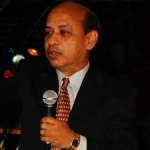
Abid Bahar
Dr. Abid Bahar, teaches at Dawson College (Montreal). His PhD thesis, Searching for Bhasani Citizen of the World: The Life and Times of (Earnest) Mozlum Leader Maulana Bhasani (Xlibris, USA) is available on line. In 1982, he completed his Master’s thesis entitled: The Dynamics of Ethnic Relations in Burmese Society: A Case Study of Ethnic Relations between the Burmese and the Rohingyas. He has contributed many papers to international seminars and conferences and published numerous papers on Burma. As a specialist in Ethnic Relations in Burma, he was recently invited to speak at the United Nation’s expert consultation on citizenship and minorities held in Geneva, Switzerland. E-mail: abahar.canada@gmail.com
